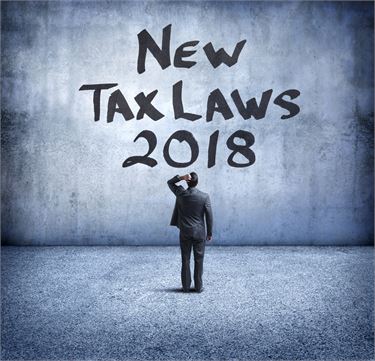PARTNERSHIP TAX LAW ALERT
New Centralized Partnership Tax Audit Rules Announced
May 25, 2018
New Rules Shift the Tax Burden from the Partners to the Partnership, Change Who Can Represent the Partnership Regarding Matters with any Taxing Authority, and Broaden such Representative’s Decision-Making Authority
 The Bipartisan Budget Act (“BBA”) repealed and replaced the preexisting audit rules with a new set of centralized partnership tax audit and tax litigation rules. The most significant BBA Rule is that any “imputed underpayment” or “partnership adjustment” (collectively, “Partnership Adjustment”) will now be paid by the partnership, not the individual partners/members. The BBA Rules also replaced the role of a “Tax Matters Partner” with that of a “Partnership Representative,” who will have _sole authority_ to act on behalf of the partnership. Additionally, either the partnership or its partners/members (as discussed below) will pay any tax assessed during the tax year in which the audit is _resolved_ (“Adjustment Year”), not the tax year to which the audit is subject (“Reviewed Year”). Taking effect for all partnership taxable years that **begin on or after January 1, 2018**, these new BBA Rules govern IRS tax audits of partnerships, limited liability companies, and other entities and arrangements classified as partnerships for U.S. federal income tax purposes.
The Bipartisan Budget Act (“BBA”) repealed and replaced the preexisting audit rules with a new set of centralized partnership tax audit and tax litigation rules. The most significant BBA Rule is that any “imputed underpayment” or “partnership adjustment” (collectively, “Partnership Adjustment”) will now be paid by the partnership, not the individual partners/members. The BBA Rules also replaced the role of a “Tax Matters Partner” with that of a “Partnership Representative,” who will have _sole authority_ to act on behalf of the partnership. Additionally, either the partnership or its partners/members (as discussed below) will pay any tax assessed during the tax year in which the audit is _resolved_ (“Adjustment Year”), not the tax year to which the audit is subject (“Reviewed Year”). Taking effect for all partnership taxable years that **begin on or after January 1, 2018**, these new BBA Rules govern IRS tax audits of partnerships, limited liability companies, and other entities and arrangements classified as partnerships for U.S. federal income tax purposes.
When are the BBA Rules in Effect?
The BBA Rules are effective for partnership taxable years that begin on or after January 1, 2018. For audits of any taxable years prior to 2018, the prior rules, which provide for the use of a Tax Matters Partner, still apply. As such, a partnership with taxable years prior to 2018 will need to address both the Tax Matters Partner and the Partnership Representative in its partnership agreement, while a partnership with only taxable years that begin on or after January 1, 2018 will need to solely address the Partnership Representative in its agreement.
Eligible Partnerships may “Elect Out” (Partner-/Member-Level Taxation)
A partnership may “elect out” of the BBA Rules for any taxable year beginning on or after January 1, 2018 if there are under one hundred “statements” in total (i.e., one statement for each partner/member, whether direct or indirect, and one statement for each shareholder of a Subchapter “S” corporation), and all partners/members are:
- Individuals;
- Subchapter “C” corporations;
- Subchapter “S” corporations;
- Foreign entities that would be treated as Subchapter “C” corporations if they were domestic entities;
- Estates of deceased partners/members; or
- Other persons or entities that may be identified in future IRS guidance.
A partnership may not “elect out” if any partner/member is a:
- Trust (including Grantor-Trusts and Tax-Exempt Trusts, both revocable and irrevocable);
- Partnership;
- LLC taxed as a partnership;
- Qualified Retirement Plan;
- Individual Retirement Plan; or
- Other person or entity that may be identified in future IRS guidance.
Any such decision to “elect out” is valid for only one year. If the partnership “elects out,” then the IRS will pass through the Partnership Adjustment to each individual partner/member, but only if it timely files its income tax return.
Electing to “Push Out” the Partnership Adjustment (Partner-/Member-Level Taxation)
 A partnership may also elect to “push out” a Partnership Adjustment to the Reviewed Year partners/members if the election is made by the Partnership Representative within forty-five days of the date that the Notice of Final Partnership Adjustment is issued by the IRS. Upon receipt of a “push-out” election, each Reviewed Year partner/member will have to calculate the additional tax for the Reviewed Year and all intervening years. Any additional taxes must then be reported and paid on a partner’s/member’s Adjustment Year tax return. In addition to such taxes, any applicable penalties and interest would also be collected at the partner/member level, with interest being charged at a rate that is two percent (2%) higher than the interest rate to be applied had the partnership paid the interest itself.
A partnership may also elect to “push out” a Partnership Adjustment to the Reviewed Year partners/members if the election is made by the Partnership Representative within forty-five days of the date that the Notice of Final Partnership Adjustment is issued by the IRS. Upon receipt of a “push-out” election, each Reviewed Year partner/member will have to calculate the additional tax for the Reviewed Year and all intervening years. Any additional taxes must then be reported and paid on a partner’s/member’s Adjustment Year tax return. In addition to such taxes, any applicable penalties and interest would also be collected at the partner/member level, with interest being charged at a rate that is two percent (2%) higher than the interest rate to be applied had the partnership paid the interest itself.
Modifying the Partnership Adjustment (Partnership-Level Taxation)
In the event the partnership decides neither to “elect out” nor “push out,” then the partnership may still be able to modify any Partnership Adjustment at the partnership level. The payments received by the Reviewed Year partners/members would then reduce the Partnership Adjustment at the partnership level. Any such modifications could take into account certain tax rate adjustments and character of income adjustments (e.g., individual tax rate versus Subchapter “C” corporation tax rate; ordinary income versus capital gains). Any supporting information would need to be delivered to the Secretary of the IRS within two hundred seventy days after the partnership receives a Notice of Proposed Partnership Adjustment from the IRS.
Early Election under Section 1101(g)(4) of the BBA (Partnership-Level Taxation)
The IRS issued temporary regulations governing elections to have the BBA Rules apply to certain taxable years beginning before January 1, 2018. Thus, a qualifying partnership may also elect for the BBA Rules to apply to any partnership tax return filed for partnership taxable years beginning after November 2, 2015 and before January 1, 2018. To elect to have the BBA Rules apply to these taxable years, such election must be made within thirty days of the date of notification to a partnership by the IRS, in writing, that a return of the partnership for an eligible taxable year has been selected for examination.

Annual Requirement to Designate the Partnership Representative
In contrast to the prior rules, under the BBA Rules there will no longer be a “Tax Matters Partner” that is designated to handle audit matters with the IRS for taxable years beginning on or after January 1, 2018. Instead, a Partnership Representative must be designated for the partnership, which will possess sole and exclusive authority to act on behalf of the partnership and bind all partners/members. (Note: If not designated by the partnership, the IRS, not the partnership, will select the Partnership Representative itself.) Each partnership agreement or operating agreement should consider the appointment, resignation, and replacement of its Partnership Representative. Partners/members should consider inserting additional provisions into their partnership agreement to address the new role of the Partnership Representative, including the following: (i) the Partnership Representative’s duties and obligations to the partners/members; (ii) the partners’/members’ obligations to the Partnership Representative; and (iii) the indemnification of the Partnership Representative against any liability with respect to the partners’/members’ proportionate share of the Partnership Adjustment.
The Partnership Representative must be a designated individual (although the Partnership Representative itself may be a legal entity); however, the Partnership Representative does not have to be a partner/member, it instead must only be someone with a substantial presence in the United States.
Tips for Ensuring Compliance
Golan Christie Taglia LLP recommends that all partners/members in partnerships (including limited liability companies and other entities and arrangements classified as partnerships) amend their respective agreements to address the new BBA Rules, which will affect all partnership taxable years that begin on or after January 1, 2018, and to consult with an accountant regarding such amendments to the Internal Revenue Code.
TO LEARN MORE . . .
The corporate law & governance and tax attorneys at Golan Christie Taglia LLP provide day-to-day business counseling and planning advice on a wide range of issues that face companies, including all aspects of partnership compliance. If you have questions or need additional information, please contact Donna F. Hartl at Golan Christie Taglia LLP.
